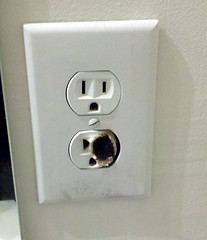Can’t Pay The Emergency Pricing Rate? We’ll Just Take Back That Generator Part You Need
It can be difficult to figure out the fine line between price-gouging and businesses trying to make up for expenses during tough times, like after a disaster. So is it wrong for a company to demand a customer pay “emergency pricing” for something like a generator part and then take back the part when that price is questioned, or just the down side of doing business?
The New Jersy-Star Ledger delves into the ins and outs of price-gouging and uses a recent example of a local couple hit hard by Hurricane Sandy. They needed to service their generator in order to get it going, so they called the company they’d used to do so before.
No one called back after the woman called the store, but two hours later a technician arrived at their home and notified them within 20 minutes that a part would need to be ordered.
They were given a bill for more than $500, which reflected what the tech called “emergency pricing”: $150 for the service call, plus $320 for labor, which accounted for a two-hour minimum.
“My husband notified the technician that it was against the law to profiteer during an emergency and accepted the bill under protest,” [she] said.
A few days later two technicians installed the part and handed over another bill, this time $160 for labor and another $78 for the actual part, and demanded payment. But the husband said he wouldn’t pay until the first bill had been discussed.
The techs went and fetched a boss, and they all demanded the couple pay the “emergency charges.” When the husband and wife refused to pay what they say amounts to extortion, the technicians took the part and turned off the generator, leaving them without power.
The company’s owner insists the employees were just conducting business in an emergency situation, adding that they’d waived a $50 service fee for the second home visit.
“We have emergency service call rates that have been the same before the storm and after the storm,” said the owner, explaining that those rates usually apply on nights and weekends and the only charged that rate on that one day after Sandy.
“Our technicians understandably did not want to work with the dangerous road conditions. We offered them double time,” she said. “On Wednesday, we made a business decision to absorb all overtime, double time and travel time without passing it on to our customers.”
She claims they removed the part in order to avoid a drawn out battle — recouping a part that hasn’t been paid for would’ve been difficult after the fact.
But one consumer law attorney consulted by the Star-Ledger says removing the part and leaving the couple without electricity is more than just a crappy thing to do, it’s a “clear Consumer Fraud Act violation,” because once the part was installed it became the property of the customers.
“To disable the generator in a time of emergency? To abandon someone in the cold and lacking utilities? That’s a pretty nice lawsuit. I wouldn’t want to be the defendant,” he said. “(The company) may have more empathy than a thief who broke in with a bandana over his head, but it’s not a lot different.”
Especially after any customer who called started on Wednesday wouldn’t have to pay that emergency rate, you’d think the company would be so kind as to retroactively apply that normal rate to the couple who called on Tuesday.
After Sandy, a debate about what actually constitutes price gouging [New Jersey Star-Ledger]
Want more consumer news? Visit our parent organization, Consumer Reports, for the latest on scams, recalls, and other consumer issues.


